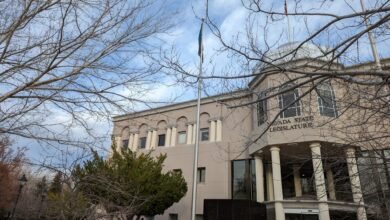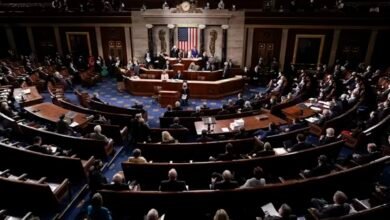Nevada’s high-stakes legislative gamble • Nevada Current

As ambitious rail projects like Brightline West push forward, Nevada stands at a critical crossroads in terms of infrastructure growth and rail safety. It’s been a year since Gov. Joe Lombardo vetoed Assembly Bill 456—a bill that aimed to strengthen rail safety protocols—and the risks that haunt our tracks are not just lingering; they are intensifying. In a state known for its high stakes, gambling with rail safety seems a perilous bet we continue to make.
In addition to Amtrak trains already operating through our state, the Brightline West project will transport the most precious cargo carried by rail: people. With this fact in mind, we simply cannot continue to gamble with rail safety—the stakes are too high.
AB 456 was designed as a comprehensive response to the escalating dangers in our rail systems, featuring crucial measures like train length limitations, improved defect detection, and provisions to clear blocked crossings. These are not mere regulatory tweaks; they are lifesaving necessities, underscored by a series of derailments in and around Nevada. Each incident serves as a grim reminder of what is at stake: fiery derailments and blocked crossings that jeopardize lives and fracture communities.
Recent investigative reports, including those by ProPublica, have highlighted a national crisis in rail safety, detailing systemic failures that lead to catastrophic accidents. These investigations have revealed that many rail companies systematically neglect crucial maintenance and push back against regulations that would mandate more rigorous safety checks and infrastructure investments.
In Nevada, the situation is dire. U.S. Congressman Mark Amodei, echoing the frustrations of many Nevadans, has criticized Union Pacific for its abysmal communication and negligence, particularly around the issue of blocked crossings. These blocked crossings are not just inconvenient; they are dangerous, preventing emergency responders from reaching crises swiftly, which could be the difference between life and death.
Furthermore, the Federal Railroad Administration (FRA) recently had to suspend its safety assessment of Union Pacific—one of the nation’s largest railroads—after uncovering that the company coached employees on how to respond to safety interviews. This coaching was widespread across Union Pacific’s 23-state network, which includes Nevada, severely undermining the authenticity of safety culture assessments. Such deceit not only skews the data that regulators rely on to assess and enhance safety but also indicates a deep-rooted culture of complacency and manipulation underpinning corporate operations.
As railroads continue to boast of rising profits amidst declining revenues—the unsustainability of this is a topic for another discussion—their repeated appearances in the halls of Nevada’s government expressing cries that they cannot afford to invest more in safety are both intolerable and unacceptable.
The pervasive influence of rail lobbyists is a significant barrier to safety improvements. Their sway in stifling regulation is powerful, as evidenced by the stalled reforms even after high-profile derailments that have captured national attention. The lobbyists’ efforts ensure that profits continue to override public safety, keeping essential safety measures like AB 456 from becoming law.
As we observe the somber anniversary of AB 456’s veto, it’s crucial that we confront the reality of our legislative landscape. Nevada must not only reinstate measures proposed in AB 456 but also champion new initiatives that place safety at the forefront of rail operations. Our state should lead by example, showing that despite its reputation for gaming, it does not gamble with the safety of its citizens.
Looking ahead, particularly with the Brightline West project, Nevada has a unique opportunity to redefine rail safety standards. We must implement a proactive approach to safety, not just for Nevada but as a model for the nation. This means extensive oversight, transparent operations, and a legislative backbone strong enough to stand up to corporate pressure.
As the tracks of progress are laid down, let’s ensure they are not only fast and efficient but also safe and secure. Nevada has the chance now to place a winning bet on the lives and safety of our residents. It’s time for a shift in priorities—from corporate profits to public safety—and for Nevada to establish itself as a leader in rail safety innovation.





